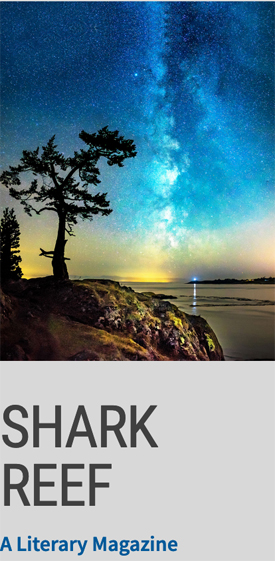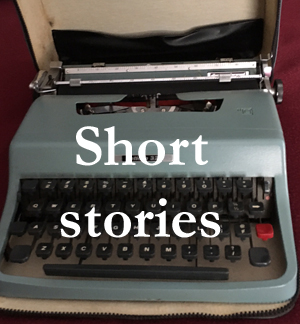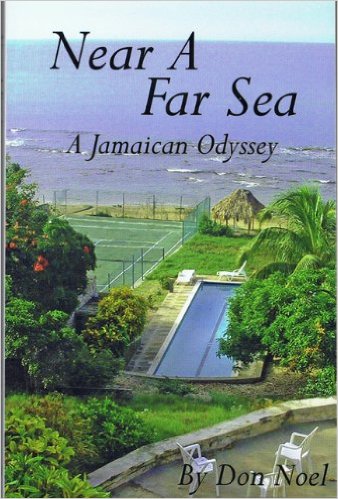Published in Shark Reef in December 2014
He called The Courier the day after they buried Priscilla. As town librarian for decades, she’d been the one who read it, occasionally calling his attention to local news. His only consistent use of the paper was to clip the crossword they did in bed together each night before turning out the light. He tried a puzzle the night after the funeral, but didn’t complete it.
And he clipped the obituary, of course. Worried it from pocket to pocket, and finally folded it into his leather-bound copy of Alcestis. The wife who died before her husband.
Max’s spaniel insistence on barking to greet the thump of the paper on the doorstep had long been a signal to spoon up with her for another half-hour’s doze. That morning after the funeral, the paper arrived just as he’d finally dropped off. He gave up, got up, and stared at himself, hollow-eyed, in the bathroom mirror. Most of the ancient Greeks shaved off their beards as a sign of mourning, although some displayed their grief by leaving beards untrimmed. Priscilla used to love running her fingers through his bush; she said it distracted attention from his bald pate and chin wattles. He would leave it untrimmed.
“Okay, Max. I hear you.” He let the dog out for a minute, watching that he didn’t trot off visiting the neighborhood, and picked up the newspaper. He glanced at it while waiting for Max, then took it into the kitchen over his cornflakes. Thick as always on a Thursday, but nothing held his attention. He no longer felt any responsibility for making things in the world come out right, so had no need to keep abreast of others’ efforts. At eight-thirty he called the paper to cancel. “Yes, Jason Adams. Yes, 134 Cumberland. Sorry, just won’t be needing it.”
All three of the kids came over that morning to distract him with inconsequential conversation before going home to their own lives. Then he drove to the florist’s and took fresh flowers to Greenlawn. The trip proved of little solace. From a distance, her grave looked like all the others, but as he approached it became apparent that the pieces of sod were freshly laid. They would soon knit; he was not sure his heart would. Apollo never got over grieving for Daphne.
Alexander, who lived two blocks away, came back to the house at cocktail hour, thoughtfully bringing his martini pre-mixed in a bottle. “You sure you just want sherry tonight, Dad?”
“I’m fine, thanks.” There’d been a time when he made gin his solace for frustrating days with inattentive students. Jason, she’d said finally, you’re not good company unless you’re sober. It was an ultimatum: The college organized his life at work, and she organized their life at home. He accepted her dictum, and was a better man for it. They celebrated a golden anniversary with a corsage and dinner a few months before her stroke. He wasn’t going back to gin; he sipped his sherry, trying to pay attention as Alex recounted his kids’ exploits.
His Billy had been Priscilla’s favorite grandchild. It’s worth growing old, she liked to say, just to watch them come along. Since his Cub Scout years, Billy had collected used papers every week from the garage, at the time a green project that gave him some pin money, and always lingered for conversation and a cookie with her. Fourteen now, wanting to be called Will, he still came once a week to take the recycling bin to the curb and have a chocolate-chip.
When there was nothing in the bin, a week after the Courier stopped coming, Will must have mentioned it to his father. Alex came over to make an unnecessarily big deal out of it. “A professor who doesn’t care about the news? What are you going to do, Dad, be a hermit?”
“Why not?”
“You’ll rot, that’s why. Mourning is natural, but all the books say you should get out and do things.”
So Alex had been reading books on how to comfort a grieving father. Nice. Filial concern. The problem, though, wasn’t so much mourning as missing. In fifty years you grew accustomed to each other’s habits and gestures and quirks, and built your own life around them, like favorite shoes or sweaters, scuffed or patched but as comfortable as your own skin.
“You do at least still go down to the college library to read The Times, I assume.”
Alex had laid a fire as soon as he arrived; it had by now settled into a ripples of flame through glowing logs. Woodsmoke blends nicely with sherry, Priscilla always said. He stared into the fire before registering the question. “No.”
“You watch the news on TV, though?”
“No.”
“God, Dad, you really are cutting yourself off.”
“It isn’t the same. Your mother used to talk all through the news. I never could persuade her to just listen.”
“So now you can hear it uninterrupted.”
“Don’t want to any more. Like hearing Lucia sing her Mad Scene without the flute obbligato, you know?”
“Dad, you’ve got to get out some.”
“I do. Max and I take flowers to Greenlawn every morning.”
“He must miss her too.”
“I suppose. He’s always been my dog. But his mournful eyes suit the occasion.” Max was curled at his feet; he reached down to scratch an ear. “Right, old man?”
“He’s good company, then.”
“Yes. I chase after him when he tries to cross the street and wander down to your house looking for Billy. I mean Will. And we walk the woods every afternoon.”
The house backed up to the golf course, which was new when they moved in but now had a generous border of mature trees, a forest compared to the skimpy buffers planted nowadays. He took Billy’s Cub Scouts out there once to teach them to identify trees and rocks and learn birdsongs, but they were at that age more interested in golf ball trophies. Billy was a hawkeye.
Alex dropped the subject, but must have told his siblings: Don’t let our father become a hermit crab. Howard, in Cincinnati, phoned the next day. “What have you been up to, Dad?”
“I’m re-reading.” The walls of most rooms in the house, where they’d lived forty of their fifty years, were floor-to-ceiling bookshelves. Priscilla, as much a reader as he was, catalogued them. The books are inexpensive insulation, she liked to say. But fiberglass is cheaper per cubic foot, he always responded. They had that conversation on the first cold day of almost every winter. A favorite refrain now stilled.
“What are you reading, Dad?”
“Euripides, for starters. Helen. Medea. Alcestis.”
“Sounds like heavy going.”
“Not really. I’m only skimming. If you know how they end, you can skip to the favorite parts.” He had scheduled the town and college librarians to come assess which books they’d like to have. He didn’t mention that.
“Aren’t they all tragedies?” Howard persisted.
“The Greeks didn’t write comedies. What have you been reading?”
“I’m your engineer son, remember? I only read mystery novels, and not many of those.”
So there was no point in talking books with Howard. They compared weather. Howard hoped the approaching winter wouldn’t deter his getting out and about. He told his number two son what he’d told Alex: He and Max had their routines.
Howard seemed determined to worry: “You’ll have snow before long.”
“Yes. Your brother’s son Will comes over to shovel me out.”
“He must not get to you sometimes until after school. You’ll be snowbound the first day.”
“Not a problem; I only take the car out to get groceries.”
“I hope you’re eating enough.”
“I’m getting good at microwaving frozen stuff.” Instead of stocking up, he bought only a few at a time, but he didn’t say that. “Don’t worry about me. Thanks.”
Marjorie, who lived in a suburb ten miles away, drove over one morning. She immediately noticed the pots and pans that hung on the kitchen wall. “You brightened the copper bottoms!”
“I did. A tradition.”
“I remember. Thanksgiving, Christmas, Easter and her birthday. And you sharpened the knives, too, the way you’ve always done?”
“You bet. A useful diversion.” He liked the carborundum stone because it demanded full attention, stroking the blade at the right angle against the grit, back and forth, slow and patient, keeping at it until the blade didn’t slide when tested on a tilted fingernail. He’d honed the blades of his Swiss army knife, too, but didn’t mention that.
“Suppose I start a pot of coffee and go see what’s in the garden?”
“You won’t find much. The season’s about over.”
She was back in a few minutes with a handful of cherry tomatoes and an eggplant. “Not much else except Mom’s big patch of kale. It loves cold weather.”
“I’ll put those in the fridge, thanks.”
“You know how to cook the eggplant?”
“I’ve watched your mother. I’ll figure it out. Microwave it.”
“I’ll take some kale home and bring you some of Mom’s soup when I come next.”
“That would be good of you.”
She brought the fragrant coffee to the dining nook where it suffused the air while they watched birds come to the feeders. Marjorie had her mother’s gift for silence on some occasions, almost like a Quaker Meeting, waiting until something came along that was worth saying. He took comfort in wordless togetherness for several minutes.
“Mom loved them, didn’t she?”
“The birds? She said they kept her in touch with God’s world.” She was a believer, and coaxed him into coming to church often enough that the pastor knew him and had been able to greet him with at least the appearance of familiarity at the memorial service.
She pointed to a bright red cardinal arriving at the birdbath. “He’s my favorite.”
“Mine, too.”
“The nuthatch was Mom’s, wasn’t it?”
“It was.” Any bird that can sing ‘hey-hey-hey’ while climbing down a rope head first is my kind of circus. He smiled.
“She filled the feeders and birdbath every morning. You must have taken that on.”
“I do it evenings. The way donut shops bake ahead for the morning rush hour.” Doing it then lessened the pain of performing Priscilla’s chores.
She smiled, and let the silence grow again.
“Have you tried the Senior Center, Dad?”
“I did. I felt superannuated.” It was nearby, a dozen blocks. He had walked over for lunch one day. “Did you know that the threshold for joining the AARP is down to fifty?”
“I know. I’m a member. But there aren’t many fifty-year-olds having lunch at senior centers yet, are there?”
“No. There aren’t any seventy-five, either.” Most of the men had slight paunches and receding hairlines; he stood out like Santa Claus. And they talked of little but the World Series and football. “The lunch wasn’t all that good, either.”
“Didn’t they have cards or games after lunch? There must be some widows who’d enjoyed being chatted up by a professor.”
“Ex-professor. Of the antiquities, which fits. And I’m not in the market.”
“Of course not. I didn’t mean that. Still, you don’t want to become a recluse.”
“I guess not.”
Soon after that visit, he came home from his woods walk to find Alex and Will in the house.
“Hello, Dad. Howard and Marjorie and I got together and bought you an iPad and an online subscription to The Times. Will has been helping set up a wi-fi system.”
“You can get it anywhere in the house,” Will added.
“Get what?”
“The signal. The Internet.”
“That’s good of you, but I’m afraid it may be wasted effort.”
“We got a gadget to stream symphonies, too,” Alex said. “You and Mom enjoyed symphonies. I assume she didn’t talk through those.”
“Stream them?”
“Find them on the Internet and show them on your TV, Gramps, ” Will explained. “You can get almost anything.”
“He’s better at it than I am,” Alex said. “He can come over to coach you.”
“Okay.” He hadn’t seen much of Will now that there were no old newspapers. He could hear Priscilla: You’re the patriarch. Play the part. “Won’t promise to use the damned thing, but come after school some day to see if I can learn how.”
Will came the next afternoon. The librarians had come that morning, so the shelves were half-naked, but he seemed not to notice. “Hi, Gramps. Dad and I looked up some websites that stream symphonies.”
For a fourteen-year-old, he thought, the lad proved extraordinarily patient. Doing a Boy Scout good deed, maybe. In an hour he had coached his grandfather through the basics, fumbling with the new remote gadgets, and steered him to the Berlin Philharmonic playing Mahler’s Second Symphony.
“Gotta go now. You can turn it off?”
“I think so. Thank you.”
“How about I come another afternoon and show you how to get the New York Times?”
“That would be okay.” He wished he could sound enthusiastic. “When you have time. No rush.”
“Maybe Saturday. See you.”
Mahler’s Second was the Resurrection, one of Priscilla’s favorites. Unlike her, he didn’t put much stock in afterlives or heaven or reincarnation, but he sat in the living room watching all ninety minutes of it. A good performance, good music, but not uplifting.
There was a heavy frost next morning. He put on the sweater on whose elbows Priscilla had sewed leather patches and the watch cap she knit him, and put the Swiss army knife in his pocket. He didn’t need to call the dog. “You know the signs of a walk, don’t you, old man?”
The golf course woods were in full autumn colors. Max busily lifted a leg here and there, marking territory as dogs do. He himself marked territory by remembrance. This is the spot where we set folding chairs to watch the golf tournament the time Arnie Palmer came. What a big man, Jason! No wonder he hits it so far. Here’s where we stood to watch a summer sun rise through that stand of white birches. Like one of Van Gogh’s suns, Jason. This morning’s sun seemed pallid.
Here was the beech tree into which he carved a heart inscribed JA+PA. The tree was now doubled in girth. New bark had grown into his handiwork, making the lovenote barely discernible. He took out the knife and opened the smaller blade. He had whetted it well; in a few minutes he had the heart and letters again brightly embossed in the smooth, dark gray skin of the tree. Like a suicide note, except that this would last for decades.
Just ahead was the red oak felled by a hurricane ten years ago, a favorite spot. The trunk makes a perfect bench, Jason. I could stay here forever. But she had not.
He eased down, trying to remember things they had talked about, sitting on this log. It was spongy now. He opened the big blade on the knife to test how deep the decay went. No, he should keep that keen-edged. He opened the smaller blade again, and drove it to the haft, releasing a puff of rotting-wood smell. In another season the tree would molder into the forest floor. Just as people molder into the earth. Dust to dust, the pastor said, but reality was moister. Uglier. He didn’t want his mind to go there. He and Priscilla should have talked about it and agreed on cremation.
The autumn colors were at their peak: yellow, amber, rust-red, scarlet. That never lasted. God – if there was one – made trees burst into color and then flame out. People, too. To every thing there is a season, Ecclesiastes wrote. A time to live and a time to die. Socrates told jurors he would gladly circumvent his aging by accepting the hemlock.
The sunshine was deceptive: He felt chilled. He pulled the blade from the rotting log, wiped it clean, and opened the larger blade. His hands were clammy.
Max jumped up, forefeet on the log, wanting attention.
“Good fellow.” He scratched the dog’s ears with his left hand, and let it be licked. Reaching down exposed the wrist, blue with veins.
How would Max react? Go barking heroically to summon help? Go to Alex’s house, looking for Will? Suppose that was who found him? He did not want to linger on that image, either.
Bright fellow, Will. There must be few his age with such mastery of the cyber-mysteries. Old enough now that he might learn to appreciate these woods. He’s learned all the birds with me, Priscilla said. But that’s inside. It’s time you take him out and teach him to bird by ear. That was just before the stroke.
He drew the left hand up to test the blade on his thumbnail. Razor-sharp. He wiped it clean on his jeans, and wiped his palms dry again.
He looked up. The sunlight was abundant now, illuminating the radiant trees. He had hardly noticed the gathering day. What he could see of the sky was cloudless blue. He tried to hear, in his mind’s ear, the opening bars of Beethoven’s Pastorale.
Perhaps young Will could find the Sixth for him as easily as he found the Mahler. He might even let himself be shown how to get The Times on that new gadget. It would take more than one session. A continuing occasion to know his grandson better. Priscilla would approve: It’s worth growing old just to watch them come along. And he might at least browse the sports section, be able to participate in a Senior Center conversation.
He stood, folded the knife and put it in his pocket. Max cavorted at his feet, insisting that they start back.
–End—





